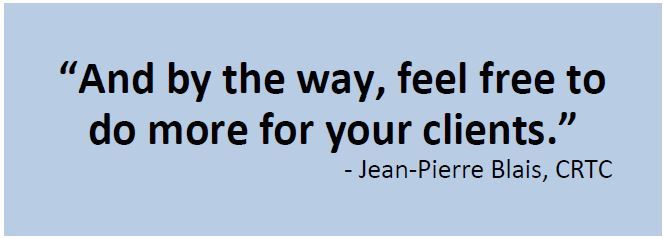
TORONTO – “Ladies and gentlemen, you know better than anyone that wireless devices are at the very core of our lives – enabling us to work, engage in social media, play games, watch movies, get directions, buy products and so much more, including financial transactions,” CRTC chairman Jean-Pierre Blais said to Canadian Telecom Summit delegates Tuesday morning.
Turning to his overarching theme of making sure Canadian citizens are at the very heart of what he does, Blais added: “Your products and services have become an extension of our jobs, our families, our personalities. They have become essential to achieving our economic and social goals. That is why fostering a more dynamic marketplace is fundamental to the public interest.”
While developing its wireless code of conduct, released on Monday, the CRTC held its normal public hearing but also went to unprecedented lengths to consult with Canadians both online and in person, and it also looked at complaints regarding wireless services received by the Commissioner for Complaints for Telecommunications Services. “Thousands of people told us about their frustration with the length of wireless contracts, cancellation fees and roaming charges, among other industry practices,” Blais said.
“We also listened to you, the wireless industry. We took note of your concerns and how you already are working to address some of these consumer frustrations. We also considered the potential costs for companies to implement changes to their systems,” he added. However, “better informed consumers will be empowered to make informed choices about the service options that best meet their needs and interests… In turn, this will inspire innovation as businesses compete to keep or win over customers – leading to a more dynamic marketplace.”
Blais said the CRTC believes its wireless code – which will take effect on December 2 – strikes a fair balance between the needs of consumers and the business realities of wireless service providers. “It provides a baseline for the rights of consumers and the responsibilities of providers,” Blais said. “And by the way, feel free to do more for your clients.”
Earlier in his speech, Blais cited the late cosmetics businesswoman Mary Kay Ash, quoting her as having said: “Everyone has an invisible sign hanging from their neck, saying, ‘Make me feel important.’ Never forget this message when working with people.” Paying attention to customers’ interests and making them feel valued builds loyalty, Blais said. He went on to say that right now many Canadians feel trapped in wireless contract arrangements that they can’t refuse.

“Going forward, Canadians will receive offers they can refuse. Wireless service providers will have to get Canadians to freely choose them,” he explained. “Canadians will have the tools that empower them. Canadians will have choice,” Blais said. “If you keep your customers satisfied, and you give them good reasons to stay, they surely will. Your clients won’t be stuck with you because of contract restrictions. They will want to stick with you as their service provider because your prices are fair and your service is good.”
Looking forward, the CRTC’s recently released three-year plan will include several major initiatives, said the chairman. First among these will be a public hearing to be held later this month in Inuvik and Whitehorse to address the issue of modernizing Northern Canada’s communication system. The hearing will also explore the subsidy regime to fund telecom services in the North, the implementation of competition, and the wholesale services used by competitors.
Also on the CRTC’s upcoming agenda will be a review of the policy for wholesale services used by competitors, as well as the essential services definition. In addition, the CRTC will hold a public hearing to review the minimum level of service that should be provided to Canadians, or the basic service objective, which will be undertaken in the 2014-2015 timeframe.


